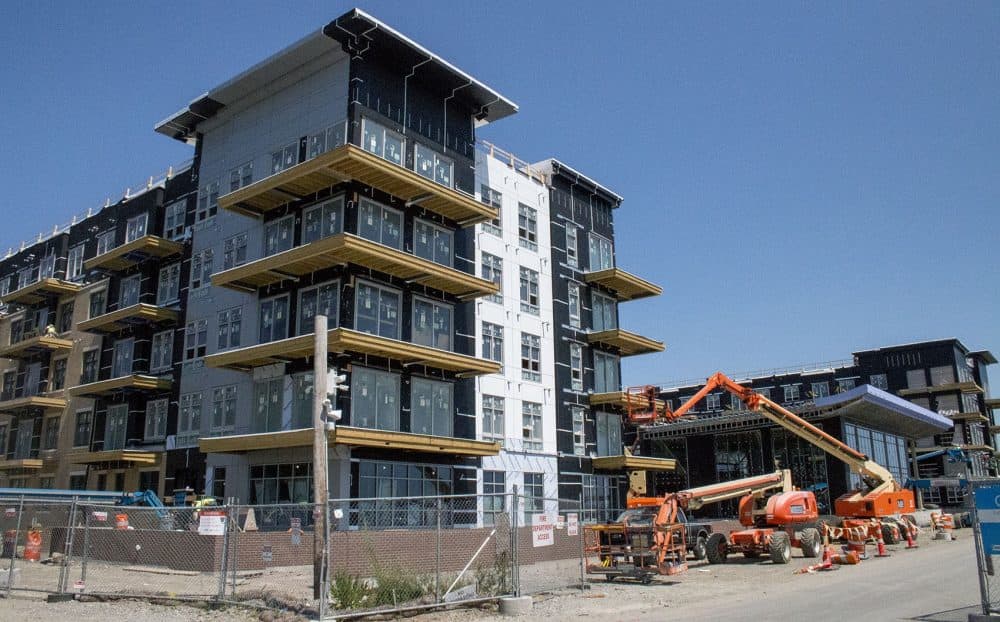Advertisement
With City Board Approval, Boston Set To Implement 'Fair Housing' Zoning Amendment

As they bring ideas for major projects before the city, developers in Boston are poised to have to confront the impact of their proposals on displacement and protected classes of people before they can gain approval.
The city's Zoning Commission Wednesday unanimously passed an amendment to "affirmatively further fair housing," a move advocates touted aims to reverse decades — or even a century — of discriminatory housing policy.
If approved by Mayor Marty Walsh, as is expected, Boston would be the first major U.S. city to adopt a zoning rule that demands builders evaluate fair housing issues in a manner similar to how parking or environmental consequences are weighed.
"There has been harm done, and we need to implement the reparation of that harm in our zoning code in order for us to be a more equitable city," said East Boston City Councilor Lydia Edwards, one of the original advocates behind the zoning rule change.
"Our communities are becoming more gentrified, having more displacement and more racial segregation with all of the building that we're doing," she said, adding that public officials play a significant role in addressing these matters.
As part of the new rule, developers would receive a report from the city that includes demographic information of the neighborhood, as well as notes on any “historical exclusion” of people within that area. In their proposals, the builders then would be required to respond to those details, as well as present “intervention options” to address any negative housing impacts.
Beyond displacement, the proposals would be reviewed for potential housing discrimination issues.
The city will also establish the Boston Interagency Fair Housing Development Committee to examine developer proposals under the new zoning requirements.
Tamara Small, CEO of NAIOP Massachusetts, which represents commercial developers, said the voices of her members were taken into account in the structuring of the new zoning amendment. She said it provides a clear framework for furthering fair housing goals in a way that works with a project.
“It gives some options for developers to look at, how can they tackle fair housing … whether it’s increasing the number of affordable units on site, or having a certain number of units with more bedrooms than others,” Small said.
The signing of the "Fair Housing" zoning amendment may be among Walsh's final acts as mayor should he be confirmed as labor secretary by the U.S. Senate. In his state of the city address Tuesday, Walsh called the change a "powerful tool to protect residents from displacement," and in a separate statement, the mayor added the policy will help reverse past practices "that have kept families of color from accessing safe and secure housing and building generational wealth."
The goal of the fair housing zoning requirement "is for proposed projects to take meaningful actions to address displacement and provide further access to housing in a way that is clear, consistent, predictable and fair,” said Sonal Gandhi, of the Boston Planning and Development Agency. Gandhi presented the amendment to the zoning commission Wednesday.
Gandhi traced the amendment back to the 1964 Civil Rights Act — which established protected groups based on race and other factors — and the 1968 Fair Housing Act, which prohibited housing discrimination against those groups.
In 2015, the Obama administration began requiring cities receiving federal housing dollars to assess barriers to fair housing, and then create plans to rectify any issues raised. These requirements were overturned by the Trump administration. However, Gandhi noted that Boston officials have tried act consistently with the Obama-era policy and is currently reviewing a draft of a citywide assessment on fair housing.
The ultimate aim of the new doctrine, Gandhi said, is to replace "segregated living patterns with truly integrated and balanced" neighborhoods.
Councilor Kenzie Bok said zoning in the United States was first developed in order to segregate people of color — now she says it has to be used to do the opposite.
“It is so important morally that we be pushing towards having actually integrated communities in Boston,” Bok said. “It is doubly important that we be taking the tool, zoning, that has been used so often as a tool for exclusion, and actively make it a tool for inclusion.”
This article was originally published on January 13, 2021.
